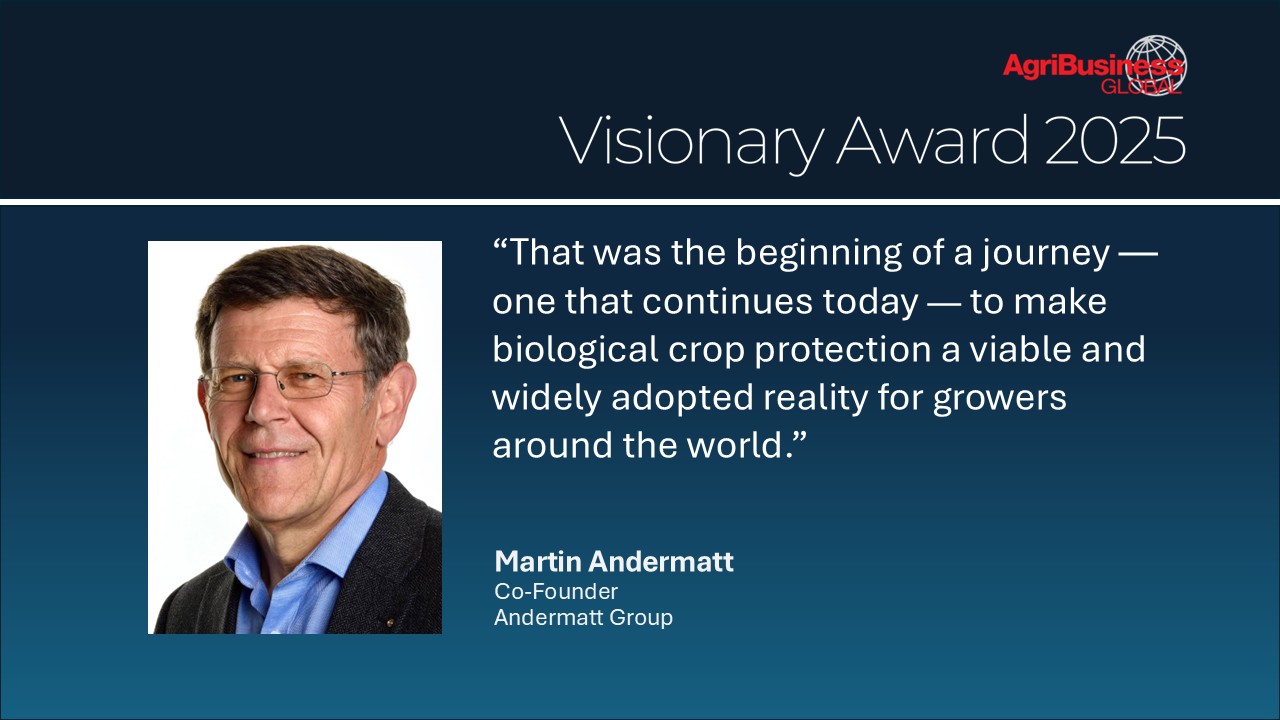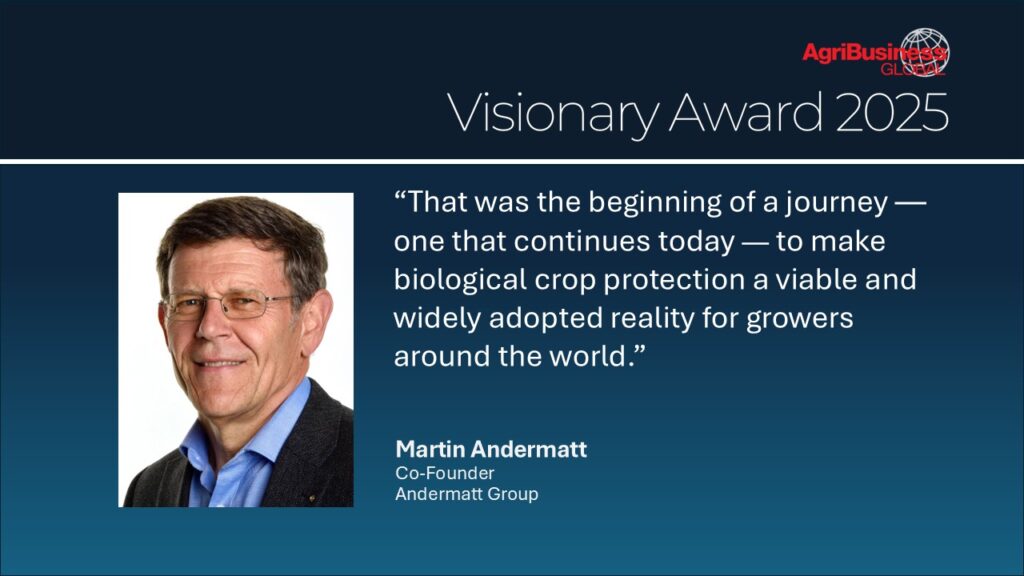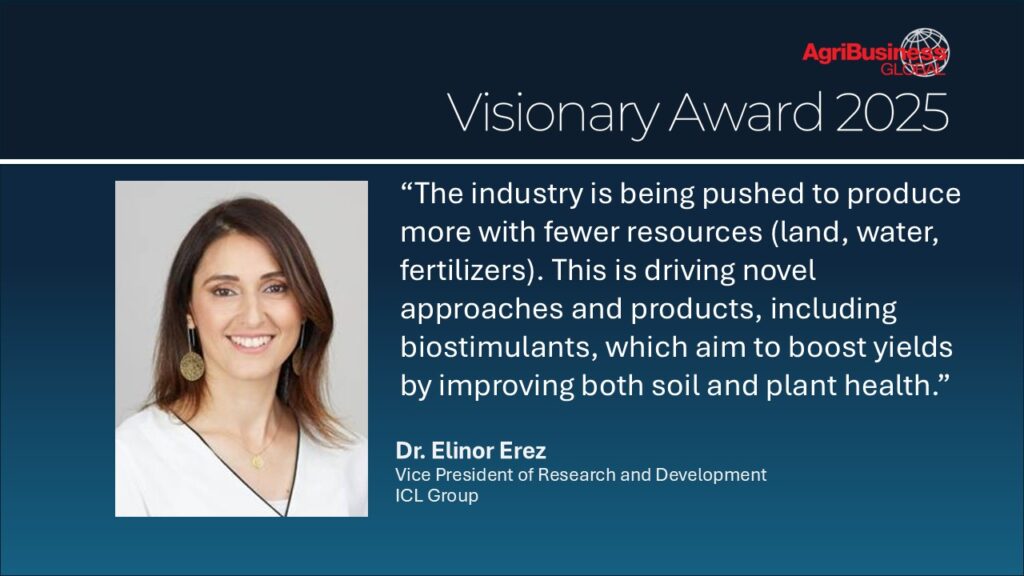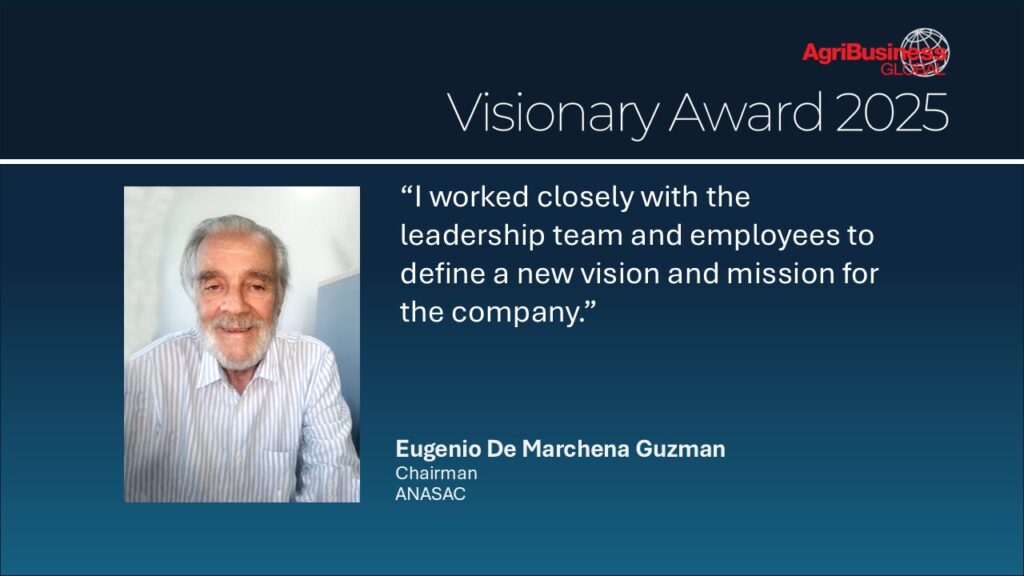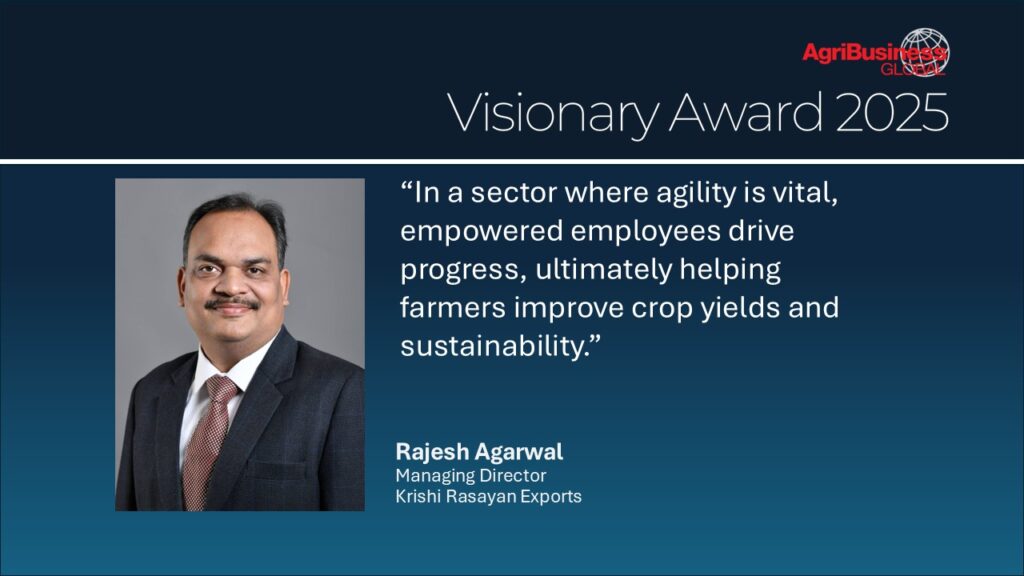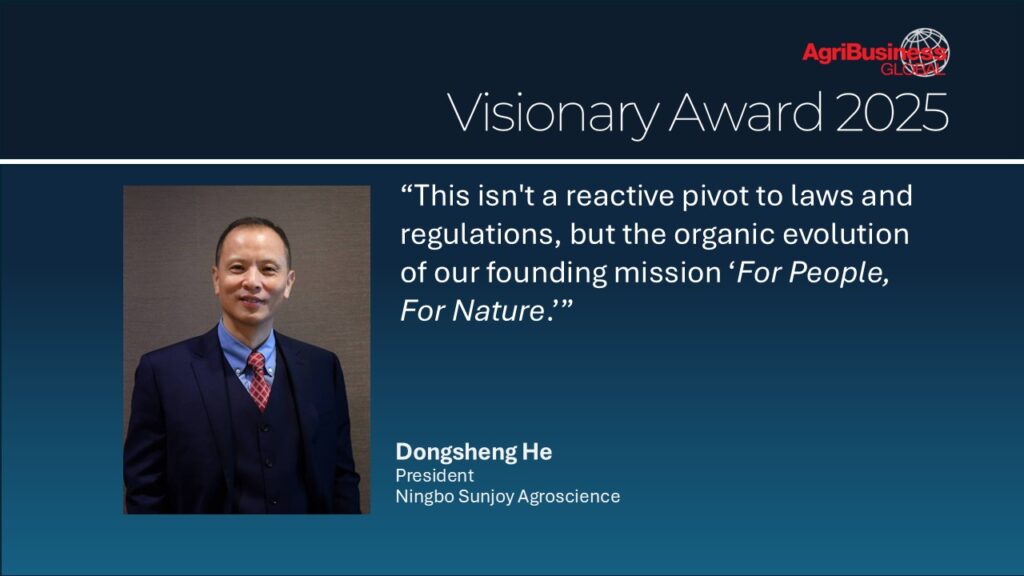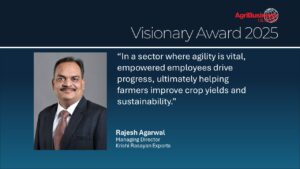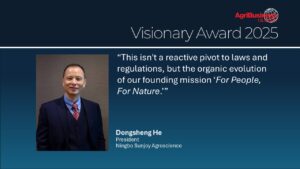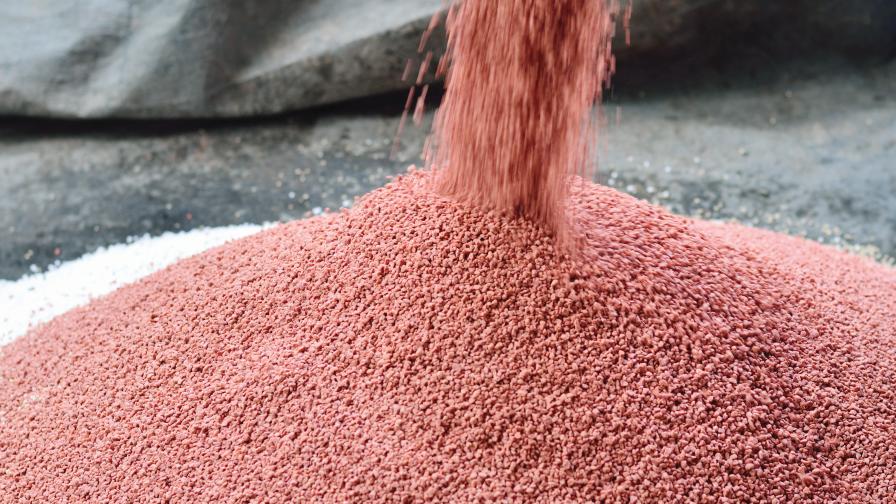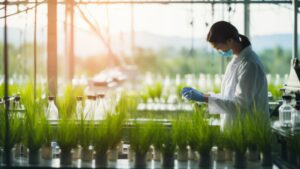Meet the AgriBusiness Global Visionary Leaders for 2025 (Part 3)
This is part three of a four-part series, as AgriBusiness Global continues to honor the 20 selected AgriBusiness Global 2025 Visionary Leaders from the crop protection, plant health, biological, and ag tech industries. Nominated by our readers, these leaders exemplify foresight, flexibility, and innovation with the ability to see changes in the market and lead others to success through strategic thinking.
ABG interviewed each leader to learn more about their business philosophies, strategies, and how they accomplish making their vision a reality. Below we profile Martin Andermatt (Andermatt Group), Dr. Elinor Erez (ICL Group), Eugenio De Marchena Guzman (ANASAC), Rajesh Agarwal (Krishi Rasayan Exports), and Dongsheng He (Ningbo Sunjoy Agroscience). View Parts 1 and 2 of our Visionary profiles here.

Martin Andermatt
Martin Andermatt
Co-Founder
Andermatt Group
Martin Andermatt and his wife, Isabel, started the Andermatt Group in 1988, which now has more than 600 employees across multiple companies researching and producing biological products. Under Andermatt’s leadership, the Andermatt Group expanded its manufacturing capabilities and established subsidiaries on different continents. The Andermatt Group is 100% owned by the founding family and employees. This ownership model reflects Martin’s belief in long-term thinking, scientific integrity, and a shared commitment to sustainable agriculture. Andermatt talked to AgriBusiness Global about how he and his wife created a vision for sustainable agriculture.
ABG: What inspired you to see that biologicals would be the future in 1988?
Martin Andermatt: Even 40 years ago, it was clear that conventional crop protection had serious disadvantages that included environmental impact, risks to users, residues in food, and growing resistance.
Biological solutions offered a way forward without these drawbacks. While promising biological options existed in laboratories, the industry showed little interest in bringing them to practical use.
Recognizing this gap, we saw an opportunity to develop a biological solution for organic apple growers in Switzerland. In 1988, we introduced our first biological insecticide, based on the codling moth granulovirus. That was the beginning of a journey — one that continues today — to make biological crop protection a viable and widely adopted reality for growers around the world.

Dr. Elinor Erez
Dr. Elinor Erez
Vice President of Research and Development
ICL Group
Dr. Elinor Erez bridged pharmaceutical methodologies with bio-ag tech by establishing an internal biological R&D hub, fostering an innovative pipeline. She implements cross-disciplinary R&D processes and delivers scalable, science-backed innovations to meet growers’ needs worldwide. Erez spoke with Agribusiness Global about how world trends feed her vision for her work.
ABG: Looking at the global biostimulant market, what trends do you observe that are influencing the vision you have for your current work and company?
Elinor Erez: Looking at the global biostimulant market, several key trends are shaping our vision and current work at ICL. The first trend is the wide variety of biostimulants on the market that enables a company with advanced development capabilities to create innovative biostimulants that will stand out with proven results at the agricultural application level.
The second trend is the increase of growers using sustainable farming practices. There is a growing trend toward using farming methods that reduce the use of chemicals and improve soil fertility, reflecting the increasing demand for eco-friendly and responsible agriculture that can be achieved by biostimulants.
The third is the pressure on growers to produce more with less. The industry is being pushed to produce more with fewer resources (land, water, fertilizers), this is driving novel approaches and products, including biostimulants, which aim to boost yields by improving both soil and plant health.
Fourth is the synergy between biostimulants and traditional fertilizers. We’re seeing the benefits that biostimulants bring to the traditional (synthetic) fertilizer business, improving their efficacy, while also driving environmentally friendly practices.

Eugenio De Marchena Guzman
Eugenio De Marchena Guzman
Chairman
ANASAC
Eugenio De Marchena Guzman serves as Chairman of ANASAC after serving as the CEO for more than 30 years. As a guiding voice for the company, he cast a vision and lead the company through a period of reinvention to expand outside of Chile. He is known for his ability to lead people with passion and resilience. He talked with AgriBusiness Global about how he made it all happen.
ABG: How did you create a vision for reinventing ANASAC and communicating that vision to others?
Eugenio De Marchena Guzman: Reinventing ANASAC was a challenging but an exciting process. First, we carried out an exhaustive analysis of the organization’s situation to identify its strengths, weaknesses, opportunities, and threats. Then, I worked closely with the leadership team and employees to define a new vision and mission for the company. This vision focused on innovation, sustainability, and service excellence.
When it was time to implement our vision, we implemented several strategies. The first was innovation. We invested in research and development to create new products and services to meet the changing needs of our customers.
The second was to invest in the training and development of our employees.
The third was collaboration and leadership. We established strategic alliances with organizations to expand our service offerings.
Thanks to these strategies, we managed to transform ANASAC into a more innovative, sustainable and customer-focused organization. I’m proud of what we’ve accomplished, and I’m excited to see what the future holds.
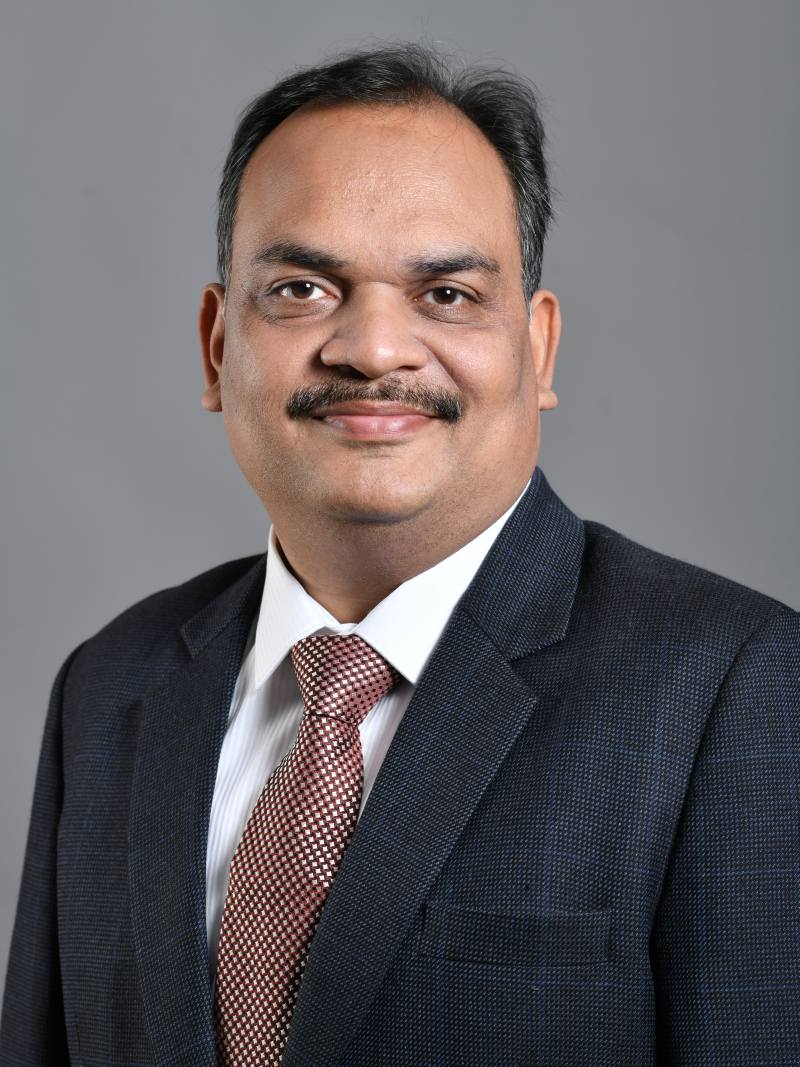
Rajesh Agarwal
Rajesh Agarwal
Managing Director
Krishi Rasayan Exports
Rajesh Agarwal is a driving force behind Krishi Rasayan Exports domestic and global growth in agrochemicals and biostimulants. He has expanded the company’s R&D initiatives, distribution, and international partnerships. He talked with AgriBusiness Global about how he keeps his staff up for the challenges of growth.
ABG: What three practices have you put in place to inspire your staff to keep up with your company’s growth?
Rajesh Agarwal: Engaged teams drive innovation, increase productivity, and help achieve sustainable food production. The three essential practices that enable teams and enhance our collective contribution are to equip teams, define clear roles, and align teams with goals.
The first is to empower teams with knowledge, growth and brand pride. An effective team equipped with the proper skills is the core of a high-performing organization. Trajectory planning of growth enables employees to visualize a direct path of advancement, thereby instilling motivation and long-term engagement. Brand establishment gives a feeling of pride about the company history, and an effective relationship develops between the group and its mission. Belongingness culture, job safety, and happiness increase productivity on the whole. When employees are valued and enabled, they are brand ambassadors and contribute to long-term growth and innovation in farming.
The second practice is establishing well-defined roles fosters confidence and accountability. When agricultural employees understand their responsibilities, they can focus on delivering meaningful results. Providing space for independent decision-making cultivates ownership and problem-solving. Team members who can act autonomously bring fresh ideas to the table, optimizing solutions for farmers. This flexibility not only enhances individual growth but also strengthens the organization’s ability to adapt to industry challenges.
In a sector where agility is vital, empowered employees drive progress, ultimately helping farmers improve crop yields and sustainability.
The third practice is setting clear objectives to help teams stay aligned with sustainable farming practices while delivering cost-effective solutions. Regular check-ins ensure consistency with broader goals while providing opportunities for feedback and innovation.
Collaboration is key — diverse perspectives drive breakthroughs in agrochemical research, distribution, and farm advisory services. Encouraging teamwork fosters creative problem-solving, ensuring farmers receive the best support possible. Recognizing progress along the way reinforces motivation, making the team feel valued and engaged in their mission.
Acknowledging the team’s efforts strengthens commitment. Recognition goes beyond financial rewards—it includes appreciation, career development, and celebrating achievements as a team. By fostering a culture of collaboration and recognition, organizations can inspire teams to drive meaningful change in agriculture.
By implementing these practices, we create a workplace where employees thrive—driving agricultural innovation and contributing to a sustainable farm solution.
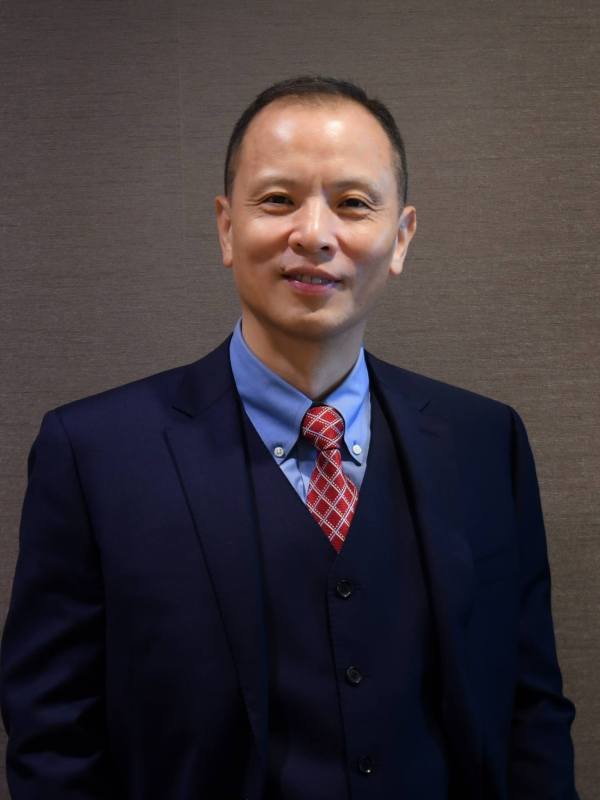
Dongsheng He
Dongsheng He
President
Ningbo Sunjoy Agroscience
Dongsheng He guided the company’s development by promoting innovation and developing a series of efficient, low-toxic, and environmentally friendly agrochemicals that align with the corporate mission of “For People, For Nature.” The continuous investment in research and production has established a robust foundation for the company’s future growth. He talked with AgriBusiness Global about his vision for his company’s contribution to sustainable agriculture.
ABG: What factors influenced your vision to move your company in producing more environmentally friendly products?
Dongsheng He: Sunjoy Agro produces a series of low-toxic and environmentally friendly agrochemical products. This isn’t a reactive pivot to laws and regulations, but the organic evolution of our founding mission “For People, For Nature.”
Ever since the company was established, we have committed to helping resolve global agricultural problems and enhance the quality of human life, at the same time, striving to minimize the impact of our agrochemical products, production, and operational activities on the environment.

